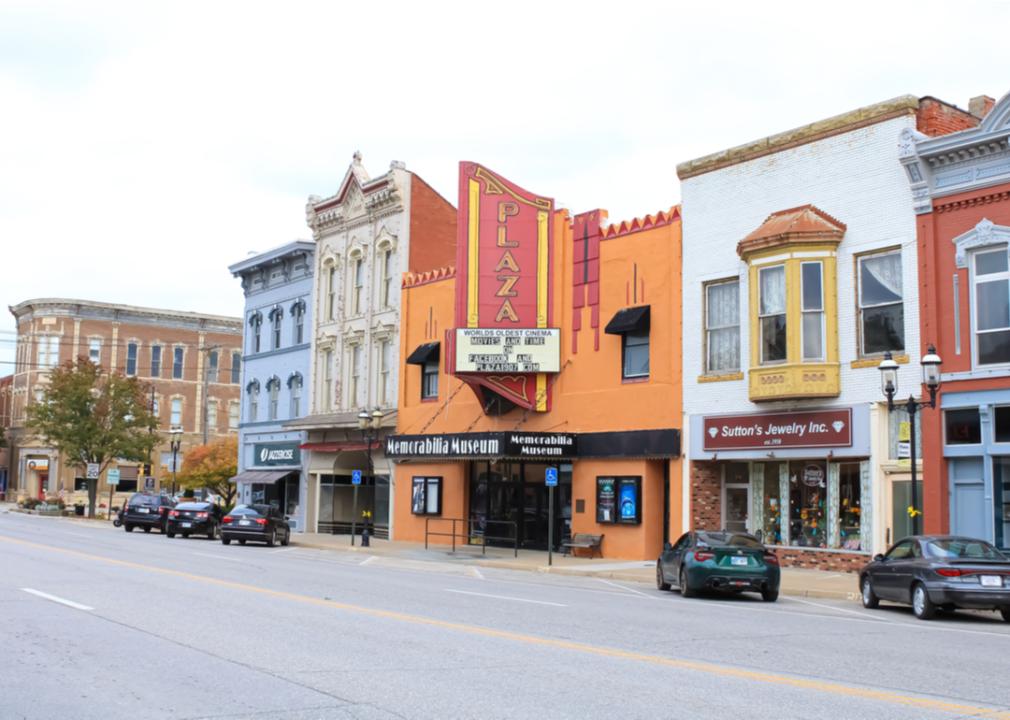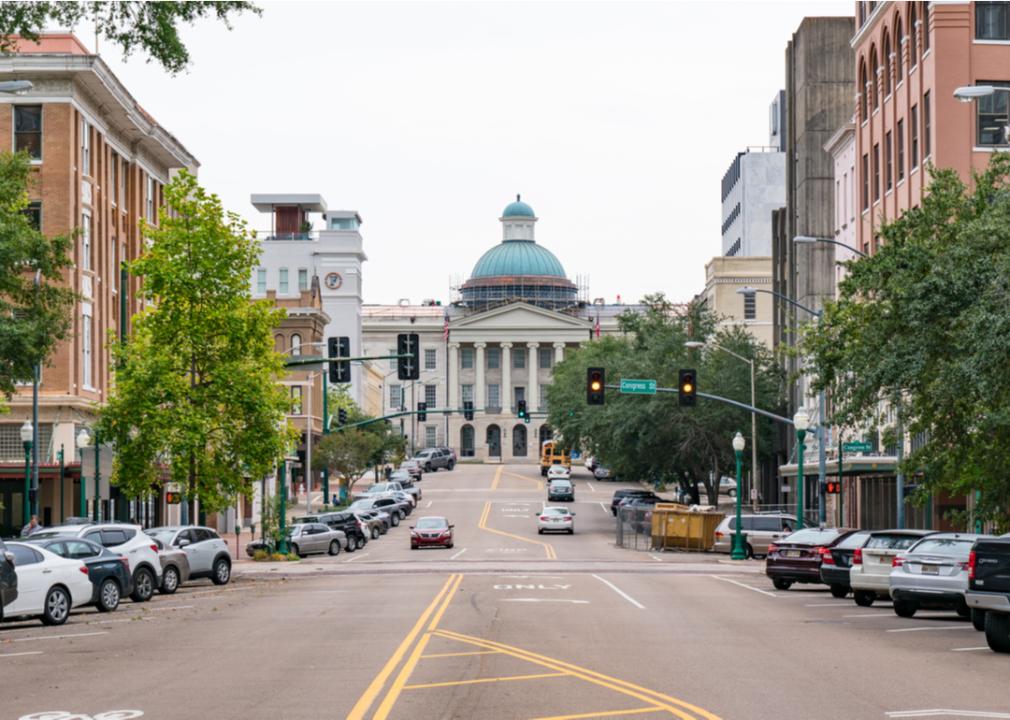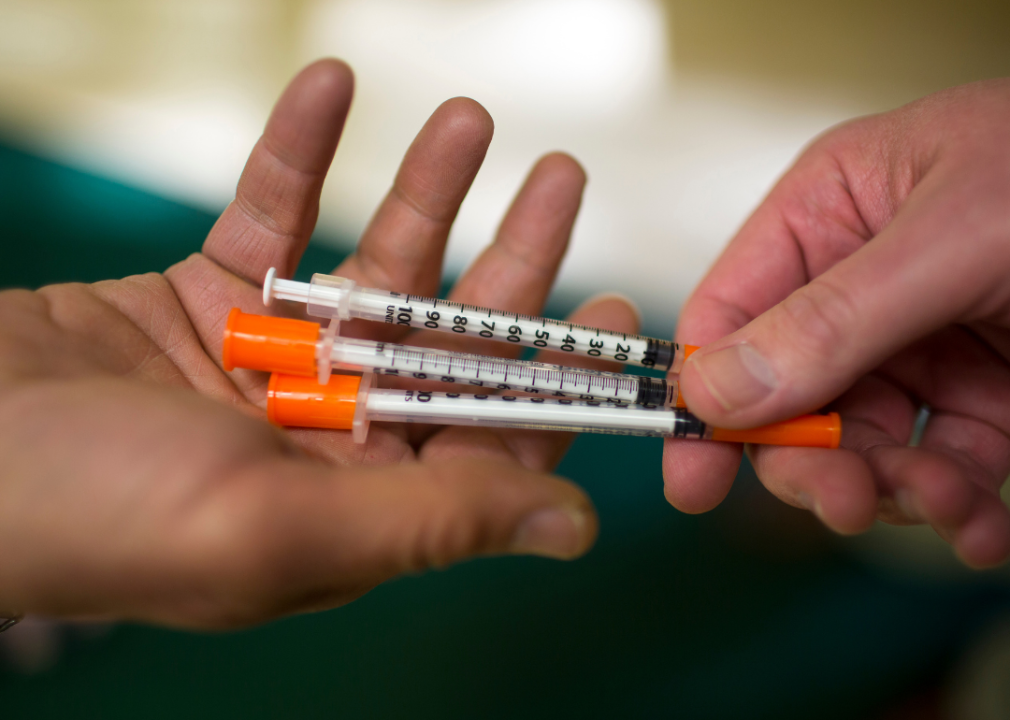6 states don’t have needle exchange programs—what it means for harm reduction efforts
Published 6:50 pm Tuesday, April 26, 2022
Robert Nickelsberg // Getty Images
6 states don’t have needle exchange programs—what it means for harm reduction efforts
Injection drug use across the United States is increasing as the misuse of prescription and synthetic opioids rages on.
Many people who misuse drugs choose to inject because it delivers a faster, more intense high. But this method of delivering drugs into the body, particularly for people who share needles or syringes, also comes with an increased risk of transmitting bloodborne diseases like hepatitis and human immunodeficiency virus (HIV).
According to the CDC, sharing syringes is the second-riskiest behavior for contracting HIV. Injection drug use is the most common way that hepatitis C is transmitted, and infection rates have been increasing, especially among younger populations. More than 40% of people between the ages of 18 and 29 have reported sharing syringes, and according to the most recent report from the CDC, hepatitis C infections were highest among people in this same age bracket, peaking at age 29.
To help slow the spread of injection-related infectious diseases, many states have implemented syringe service programs (SSPs), also referred to as syringe or needle exchange programs. These programs offer safe disposal of used syringes, access to sterile needles and syringes, vaccination and testing, and substance use treatment resources.
Opponents of these resources claim that access to injection equipment only encourages drug use. For many critics, SSPs are ethically and politically dubious. However, research shows this type of harm reduction effort is doing the opposite by destigmatizing drug use and providing exposure to treatment options and health care professionals.
According to one study, first-time participants in Seattle needle or syringe exchange programs were up to five times more likely to enter treatment for substance use disorder than people who did not utilize these resources. Regular program participants are about three times more likely to reduce or quit injection drug use than people who have never participated in a syringe service program. More than 50% of people who inject drugs get syringes from SSPs, effectively reducing the rate of needle sharing across communities.
Syringe exchange laws fall into three categories: laws that allow the establishment of syringe exchanges statewide, laws that regulate the sale of syringes with or without a prescription, and drug paraphernalia laws that include or exempt syringes from the classification. Some states also provide protection against prosecution when needles are returned via an SSP with drug residue.
In November 2021, New York City took two currently existing needle exchange programs operating in East Harlem and Washington Heights and turned them into the country’s first supervised drug injection sites. On their first day, they reversed two overdoses.
Not every state provides access to these lifesaving resources, and in some cases, politicians are looking to make access even more restrictive. Zinnia Health identified six states that don’t have sterile syringe exchange programs, citing data from the Kaiser Family Foundation, and explored what that means for public health efforts in the state. While the Kaiser Family Foundation includes Delaware in its report, additional research shows Brandywine Counseling and Community Services are offering syringe exchange services as of 2021. Research is drawn from a variety of medical studies, news reports, and governmental health organizations within the states.
South Dakota, Nebraska, Kansas, and Mississippi, included on this list, are also part of a group of only six states that, as of 2020, did not request CDC consultation to determine if they are at risk of significant increases in hepatitis infections or an HIV outbreak due to injection drug use.
![]()

Sean Pavone // Shutterstock
Alabama
Alabama law does not legally permit SSPs. However, efforts have been made in recent years to legalize them. The Alabama Injection Associated Infectious Disease Elimination Act was introduced on April 4th, 2019. The bill, which died in committee, proposed pilot syringe exchange programs in high-risk counties and criminal immunity to encourage participation in the programs. Alabama has the highest opioid dispensing rate in the country, with 80 prescriptions written per 100 people—nearly double the national rate. In 2020, the most recent data available, Alabama saw a 20% increase in opioid overdoses.

Sabrina Janelle Gordon // Shutterstock
Kansas
Kansas ranks seventh out of the top ten states with the highest opioid dispensing rates. Needle exchange programs are not legally permitted to operate in the state. Additionally, syringes are included, without exception, in the state’s drug paraphernalia laws. Four Kansas counties were included in a group of 220 across the country determined to be at risk for viral hepatitis infection or HIV outbreak due to injection drug use. There is currently no proposed legislation to legalize needle exchange programs.

Paul Brady Photography // Shutterstock
Mississippi
Mississippi has one of the highest opioid dispensing rates in the country, with 64 prescriptions written out of every 100 people. Currently, Mississippi law does not explicitly authorize the exchange of syringes, and syringes are classified as paraphernalia. The state does not legally prohibit the retail sale of syringes without a prescription. A bill introduced in 2019, which died in committee, attempted to make it illegal to sell, purchase, or possess syringes without a written prescription.

Canva
Nebraska
Needle exchange programs are not legally authorized to operate in Nebraska. Additionally, syringes are considered drug paraphernalia and anyone found in possession can be charged with an infraction and a maximum fine of $100. However, pharmacies can sell syringes without a prescription to reduce the spread of injection-associated infectious diseases. The Nebraska Department of Health found that the percentage of high school students who used a needle to inject an illegal drug one or more times during their lifetime was higher in Nebraska than the national average. No legislation to legalize needle exchanges has been introduced in Nebraska since 1999.

Canva
South Dakota
South Dakota has one of the highest rates of reported acute hepatitis C infections in the country. According to a 2021 HIV/AIDS Surveillance Report conducted by South Dakota’s Department of Health, 13 out of 66 counties in the state were identified as highly vulnerable to opioid overdose and bloodborne infections. About 18% of South Dakotans diagnosed with HIV reported injection drug use—nearly three percentage points higher than the national average. However, needle exchange programs are illegal in South Dakota. Additionally, the use or possession of drug paraphernalia, including syringes, could result in a misdemeanor charge. There is currently no proposed legislation to legalize needle exchange programs.

Canva
Wyoming
There are no state laws prohibiting the possession of drug paraphernalia, including syringes, in Wyoming. And while there are no laws permitting needle exchange programs in the state, there are also no laws expressly prohibiting them either. In 2019, the Wyoming Department of Health partnered with Harm Reduction Coalition to launch a two-year initiative focused on harm reduction services and programs to reduce opioid overdoses and HIV and hepatitis C infections. The effort emphasized serving tribal communities.
This story originally appeared on Zinnia Health
and was produced and distributed in partnership with Stacker Studio.






